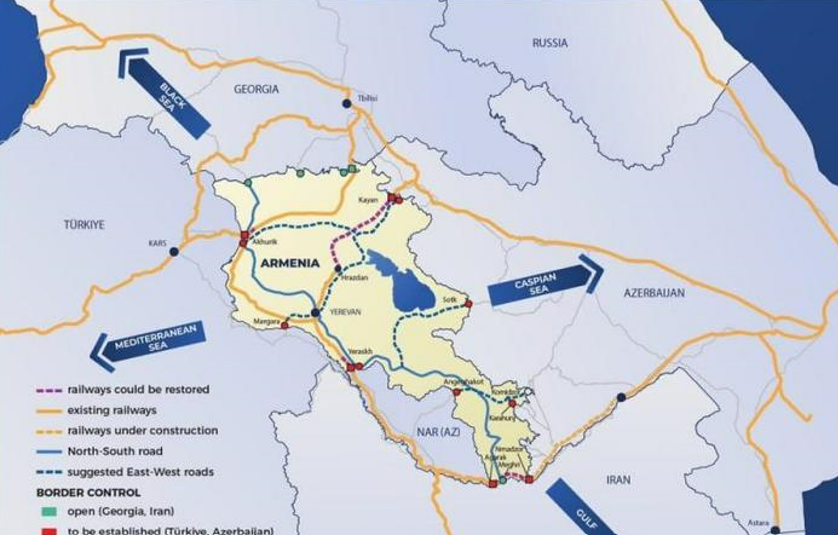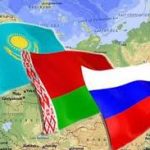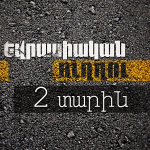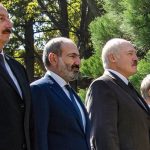- 9 November, 2024
- Foreign Policy

Four years have passed since the signing of the trilateral statement by Armenia, Russia, and Azerbaijan that ended the 44-day war in 2020.
On September 19, 2023, Azerbaijan launched a military offensive against Nagorno-Karabakh, forcibly displacing the population and forcing the leadership of Nagorno-Karabakh to sign a document on the dissolution of the republic, while the Russian peacekeeping force called to ensure the safety of Armenians of Nagorno-Karabakh left the region.
After November 9, 2020, the Union of Informed Citizens has regularly published articles on the implementation of the nine clauses of the trilateral statement, tracking the extent to which the parties comply with their commitments and the stage of implementation of different actions.
And although after September 2023, most of the clauses of the November 9 statement have lost their relevance, nevertheless, the ones related to regional transport links and prisoners of war continue to be the subject of negotiations.
COMMUNICATION
Clause 9 of the trilateral statement of November 9 stipulates that all economic and transport links in the region shall be unblocked.
“The Republic of Armenia shall guarantee the safety of transport communication between the western regions of the Republic of Azerbaijan and the Nakhichevan Autonomous Republic with a view to organize the unimpeded movement of citizens, vehicles and cargo in both directions. Control over transport communication shall be exercised by the Border Guard Service bodies of the FSS of Russia,“ the aforementioned clause reads.
At the same time, Clause 6 of the trilateral statement stipulates that the Lachin corridor connecting Armenia and Nagorno-Karabakh shall continue to function under Russian control, and Azerbaijan shall guarantee safe movement of citizens, vehicles and cargo in both directions along the Lachin corridor.
On January 11, 2021, the leaders of Armenia, Russia and Azerbaijan adopted the second trilateral statement, the main focus of which was the creation of a working group that would deal with issues of unblocking all economic and transport links in the region.
However, the subsequent negotiations showed that Azerbaijan does not accept Armenia’s proposals to implement Clause 9 of the November 9 statement, namely, ensuring the communication between Azerbaijan and Nakhichevan in accordance with an internationally accepted procedure, but, rather, demands an extraterritorial corridor which will not be under Armenian control.
The Armenian side consistently rejected these claims by Azerbaijan, despite the fact that in response, Azerbaijan exploited the issue of the Lachin Corridor, threatening to block it. Indeed, in December 2022, Azerbaijan blocked the Lachin Corridor with the help of government-controlled “eco-activists”, laying siege to Armenians of Nagorno-Karabakh. The blockade lasted until the complete depopulation of Nagorno Karabakh in September 2023.
Until then, however, strong pressure continued to be exerted on Armenia during 2021 and 2022 to provide Azerbaijan with a corridor through the Syunik Province of Armenia, which would be under Russian control. Russian border guards had even begun to surround the area through which the corridor would pass with barbed wire. In turn, Azerbaijan continued its aggressive rhetoric and attacked Armenia on September 13, 2022, trying to force Yerevan to accept its terms. However, the Armenian side managed to stop the advancement of the Azerbaijani army at the cost of heavy losses.
It should also be noted that the Islamic Republic of Iran is also actively involved in the matter of unblocking regional communications. Iran explicitly declares that it will not allow any territorial changes in the region and that it is against roads controlled by third parties. We suggest reading this article about the reasons for Iran’s position. There is a hypothesis that Iran is against not only the extraterritorial corridor, but also any road that would connect the two parts of Azerbaijan through the territory of Armenia.
The European mediation was also noteworthy in terms of unblocking regional communications. In particular, after the negotiations between the President of the European Council, Charles Michel, and the leaders of Armenia and Azerbaijan, there was talk about restoring the railway communication, but no further progress was made in this regard.
Nevertheless, after the events of September 2023, when Nagorno-Karabakh was depopulated and the Lachin Corridor ceased to exist, the statements about unblocking regional communications took on a different course.
In particular, since October 2023, Armenia has been advancing the concept of the Crossroads of Peace. With this project, Armenia proposes to create five checkpoints on the border of Armenia and Azerbaijan, near Kayan, Sotk, Karahunj, Angeghakot and Yeraskh, and another two checkpoints on the border of Armenia and Turkey, in Akhurik and Margara. Moreover, as emphasized by the Armenian side, all the infrastructures, communications and roads of the Crossroads of Peace shall be under the jurisdiction of the countries through which they pass, and each country shall independently guarantee their safety.
Azerbaijan rejects these proposals by Armenia, referring to the trilateral statement of November 9, particularly Clause 9 of the statement. Russia does not welcome the Crossroads of Peace project either, noting that it is just a “broader vision of the future of regional communication,” and also alluding to the November 9 statement.
It is noteworthy, however, that the “Crossroads of Peace” was welcomed by the USA, Georgia, Greece, while Iran and India at least did not reject it, emphasizing the importance of the North-South global project, which should connect India and the Persian Gulf with Russia and Europe.
PRISONERS OF WAR
The other clause of the trilateral statement of November 9, which remains relevant, concerns prisoners, but there has been no positive shift in this direction in the recent year. Soldiers and civilians captured during the 44-day war in 2020, as well as former officials of Nagorno-Karabakh, who were captured after the September aggression of 2023, continue to remain in captivity.
According to different sources, 55 Armenian prisoners are still being held in Azerbaijan, including 6 civilians, 41 prisoners of war and 8 former high-ranking political and military officials. However, there are hypotheses that the number of Armenians forcibly kept in Baku may reach 80.
P․S․
Clause 7 of the November 9 statement says the following: “Internally displaced persons and refugees shall return to the territory of Nagorno Karabakh and adjacent regions under the control of the Agency of the UN High Commissioner for Refugees.”
As has already been noted, after September 2023, Nagorno-Karabakh was completely depopulated, and the Russian peacekeeping troops, which were supposed to ensure the safety of Armenians of Nagorno-Karabakh, left the region. According to Prime Minister Nikol Pashinyan, the Armenian authorities do not consider the return of Artsakh Armenians to Nagorno-Karabakh realistic. Instead, some segments of the Armenian opposition, as well as figures from Nagorno-Karabakh, regularly demand that Armenia raise the issue of the return of Artsakh Armenians in various international platforms.
It should also be noted that there is also an active discourse in Armenia about abandoning the November 9 statement altogether. However, it is not supported by the government, which claims that the November 9 statement still continues to give some leverage to Armenia to present demands to Azerbaijan.
Vahe Ghukasyan
Union of Informed Citizens




